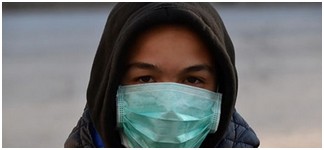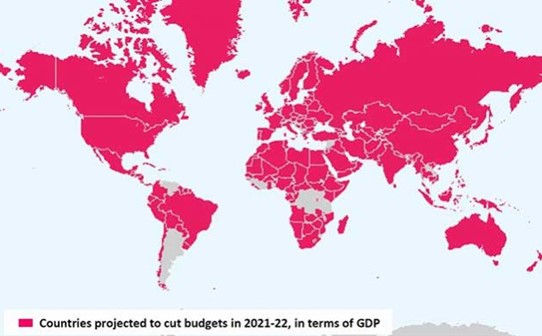Justice in the Era of COVID-19: Our Global Responsibility – Gender
Извор: WUNRN – 01.04.2020

By Fernando Travesí, Executive Director
March 27, 2020 – Today, we are facing a global public health crisis of unprecedented proportions. Only time will tell the devastating toll that COVID-19 will exact on human life. The breakneck speed at which the virus is spreading does not give us reason for optimism in the near future. At the writing of this letter, more than 575,000 cases and 26,000 deaths have been recorded worldwide. The pandemic has also paralyzed the world economy.
To deal with the crisis and slow the spread of the disease, countries, major cities, and other municipalities have declared states of emergency and have issued strict orders requiring nonessential businesses, government offices, and schools to close and residents to stay at home and limit social interactions. As a result, factories have reduced or suspended production, government agencies have begun furloughing employees, and companies large and small have been laying off workers by the thousands, rattling the markets. Among the hardest hit are low-wage workers, many of whom depend on the informal or gig economy.
We at ICTJ fully grasp the gravity of the crisis, and we take our responsibility for the health and safety of our staff, partners, and communities where we work seriously. We adhere to all orders and recommendations issued by public health organizations and are taking all necessary precautions to slow the spread of the virus. To this end, ICTJ closed its headquarters in New York last March 13 and since then gradually all of its country offices. Staff members continue working from their homes, making optimum use of the technology available to remain in contact with one another and our partners across borders and in the field.
ICTJ has also suspended all travel until at least May 1 and postponed meetings, conferences, workshops, and other gatherings scheduled for the next three months. These are challenging times and we are proactively adjusting and revising our work plans to ensure we are able to continue advancing our mission and supporting transitional justice processes all over the world in this trying time. ICTJ is and remains, perhaps above all, a supporter and convener of stakeholders and changemakers pursuing justice in the most challenging contexts. Even in this moment of mass confinements, restrictions on movement, telecommuting, and social distancing, rest assured we are exploring all options to continue bringing people together, virtually and through more targeted efforts to maintain and build relationships.
The daily news cycle has all but transformed into a singularly focused, nonstop update on the current global health crisis. In-depth reporting and analysis that just a few weeks ago might have been dedicated to events in countries affected by war or emerging from conflict or repression have taken a backseat to the COVID-19 epidemic. This realignment of priorities in the news media is entirely justified and in fact vitally important to ensuring all people have exposure to accurate and up-to-date information, especially if this information reaches vulnerable and marginalized communities. In many of these communities, people have little or no access to reliable information or to justice — they are victims of human rights abuses, they live in war-torn societies, they are refugees or internally displaced persons. These human beings are more often than not among the neediest in the world, and will certainly be the most susceptible to the ravages of the coronavirus.
In fact, the COVID-19 crisis has already shown that we are facing more than just a medical emergency. The pandemic has stretched to the limit or even broken the health care and social services systems of some of the richest countries in the world. More broadly, the situation is bringing to the surface many other underlying social, political, and economic problems rooted in historical inequality, exclusion, and injustice. Now that the coronavirus has beset poorer countries — where institutions are weaker, most of the economy is informal, and many cannot afford the “luxury” of home confinement or the extra space needed for social distancing — the number of cases and deaths will likely skyrocket. There will also be increased risk of social turbulence or violence. Similarly, some authoritarian governments may exploit the preventive measures they are putting in place to contain the virus to expand or abuse their power.
The warlike language frequently deployed in the media or by politicians to describe the pandemic and the measures to address it doesn’t help. This terminology can be useful in conveying to the population a sense of urgency and the formidable obstacles that lie ahead, and in describing the mobilization of resources to deal with the effects, which can be similar to what an armed conflict requires. However, it can also work to overshadow or even diminish the real tragedy and chaos of war, which is currently raging in numerous parts of the world. The coronavirus is without doubt a scourge on humanity, but it is not an armed enemy deliberately shooting at us from behind the battle lines or planning rational strategies to kill humankind.
In real-life war zones, such as those in Syria and Yemen, this pandemic will likely overwhelm already devastated populations — people whose homes have been destroyed or who are fleeing persecution, who are hungry, who have lost their livelihoods, and who lack access to medical care and other basic services. In countries emerging from conflict or repression and grappling with legacies of massive human rights abuses, many victims and members of marginalized communities still struggle to earn a livelihood and secure adequate food, clean water, and health care; they, too, are acutely vulnerable to the coronavirus.
In these times, we all feel at risk, uncertain, and disoriented, even as many of us shelter in place in our homes with working electricity, running water, and high-speed internet. Grocery stores and other essential services, though stretched thin, are likely nearby, ensuring that the supply chain remains intact and averting social panic and very possibly civil unrest. In addition, some of our governments have the resources and capacity to take bold decisions to cope with the social and economic impact. To be sure, our fears are warranted; the mortal threat to our health and that of our families and communities is an indisputable fact. Similarly, the devastating consequences that many are already confronting, in terms of unemployment and loss of family income, are undeniable. Nevertheless, our home confinement should also give us some space to pause for a moment and think about our privileges. The sense of vulnerability we feel today should make us empathetic to those living in far more fragile circumstances, whether close to home or further afield, and who will be most adversely affected by the epidemic.
The coronavirus was declared a pandemic on March 11 when it had reached more than 100 countries. COVID-19 first appeared in Wuhan, China, where it quickly spread through the city. Though efforts in Wuhan to contain the virus were by all measures expansive and exceptional, the virus escaped. Not only did it break free from a total lockdown, it leapfrogged borders and oceans and crisscrossed countries and continents in a matter of weeks. At the time of this writing, cases of COVID-19 have been recorded in more than 190 countries.
Just as extraordinary has been the global nature of the response. Scientists, medical researchers, and public health experts from around the globe have been crowdsourcing and collaborating virtually and in real time to share findings and best practices. The solution, whether it be a vaccine, a surefire treatment, or both, will hopefully be a universal one and distributed across borders to everyone affected, at little or no cost to them.
Yet, there is genuine concern that the measures to isolate ourselves and to prevent the virus from spreading could in fact contribute to racist and xenophobic attitudes and the growing trend of geopolitical isolationism among nations — that is, a turning inward within societies and away from international cooperation and assistance. It is therefore imperative that we design and execute global solutions that both protect the health of everyone and affirm the dignity of those who have suffered violations of their rights, including economic, social, and cultural rights, and who have been deprived of justice.
Medical and public health experts are urging us all to wash our hands frequently and thoroughly. The common expression “to wash one’s hands of something,” usually means to absolve oneself of responsibility for something. In the current global crisis, the meaning seems to have been turned on its head. In washing our hands today, we are accepting, embracing our responsibility for others wherever they are. As we gaze upon the road ahead, may we similarly embrace our responsibility for the most vulnerable and for all victims of human rights violations all over the world
International Center for Transitional Justice
https://www.ictj.org/news/justice-era-covid-19-our-global-responsibility



